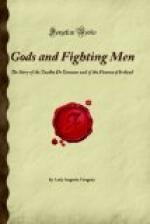And when he saw it hanging on the wall it is what he said: “Come summer, come winter, from the mouth of harps and bags and pipes.” Then the harp sprang from the wall, and came to the Dagda, and it killed nine men on its way.
And then he played for them the three things harpers understand, the sleepy tune, and the laughing tune, and the crying tune. And when he played the crying tune, their tearful women cried, and then he played the laughing tune, till their women and children laughed; and then he played the sleepy tune, and all the hosts fell asleep. And through that sleep the three went away through the Fomor that would have been glad to harm them. And when all was over, the Dagda brought out the heifer he had got as wages from Bres at the time he was making his dun. And she called to her calf, and at the sound of her call all the cattle of Ireland the Fomor had brought away as tribute, were back in their fields again.
And Ce, the Druid of Nuada of the Silver Hand, was wounded in the battle, and he went southward till he came to Carn Corrslebe. And there he sat down to rest, tired with his wounds and with the fear that was on him, and the journey. And he saw a smooth plain before him, and it full of flowers, and a great desire came on him to reach to that plain, and he went on till he came to it, and there he died. And when his grave was made there, a lake burst out over it and over the whole plain, and it was given the name of Loch Ce. And there were but four men of the Fomor left in Ireland after the battle, and they used to be going through the country, spoiling corn and milk and fruit, and whatever came from the sea, till they were driven out one Samhain night by the Morrigu and by Angus Og, that the Fomor might never be over Ireland again.
And after the battle was won, and the bodies were cleared away, the Morrigu gave out the news of the great victory to the hosts and to the royal heights of Ireland and to its chief rivers and its invers, and it is what she said: “Peace up to the skies, the skies down to earth, the earth under the skies; strength to every one.”
And as to the number of men that fell in the battle, it will not be known till we number the stars of the sky, or flakes of snow, or the dew on the grass, or grass under the feet of cattle, or the horses of the Son of Lir in a stormy sea.
And Lugh was made king over the Men of Dea then, and it was at Nas he had his court.
And while he was king, his foster-mother Taillte, daughter of Magh Mor, the Great Plain, died. And before her death she bade her husband Duach the Dark, he that built the Fort of the Hostages in Teamhair, to clear away the wood of Cuan, the way there could be a gathering of the people around her grave. So he called to the men of Ireland to cut down the wood with their wide-bladed knives and bill-hooks and hatchets, and within a month the whole wood was cut down.
And Lugh buried her in the plain of Midhe, and raised a mound over her, that is to be seen to this day. And he ordered fires to be kindled, and keening to be made, and games and sports to be held in the summer of every year out of respect to her. And the place they were held got its name from her, that is Taillten.




